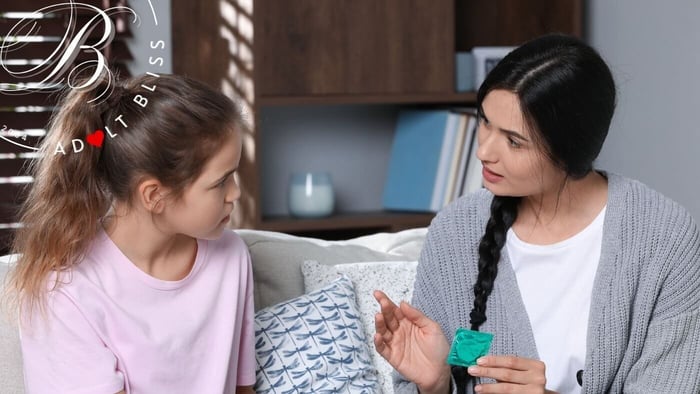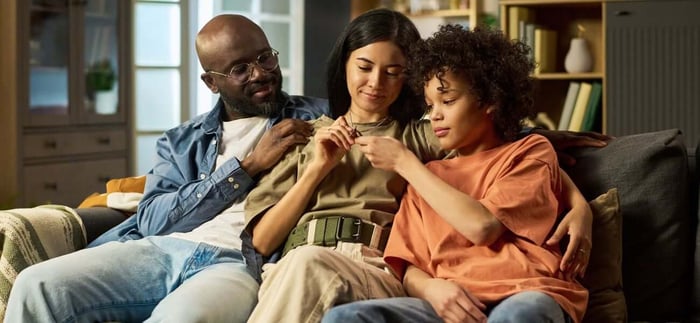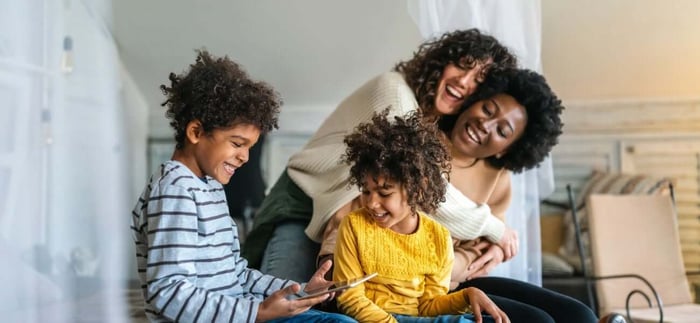
How to Talk to Your Kids About Sex: Building a Sex-Positive Home
Jump To Section
Why It’s Important to Talk to Your Kids About Sex
Let’s be real: Trying to talk to your kids about sex isn’t always the easiest thing to talk about. Especially with children. Especially not if you come from an African background (Mulholland et al., 2021; Napier-Raman et al., 2023). From personal and anecdotal experience, I can safely say that sexual health and sexuality are not topics easily broached in these households. Sexual activity is usually a quick explanation of the birds and the bees, and the culturally approved, standard “no sex before marriage” talk, and that’s it. In most homes, these topics are usually considered taboo (Botfield et al., 2017; Lirios et al., 2024; Napier-Raman et al., 2023).
I was lucky and considered weird, because my mom believed I was responsible for my own sexual health and should know more than just the mechanics. Although her preference was waiting until marriage (Can you imagine if I had waited? I would have been a 35-year-old virgin! And horny AF!). Regardless, this glimpse into sex brought on a free-living, sex positive black woman. Go figure. That all being said when you talk to your kids about sex early, you help them build healthy attitudes and confidence.

Raising Boys in a Sex-Positive Home
Now, in this internet-driven, post MeToo, Time’s Up, and Black Lives Matter world, I think it’s more important than ever for my boys to understand sex and sexual health in an age-appropriate way. Learning how to talk to your kids about sex—especially boys—starts with openness and trust. Here are some of the reasons I’ve decided to raise my mixed-race babies in a sex-positive household:
1. I want authenticity
Honestly, I’m not going to hide myself for anyone, and that includes these little humans I’m raising. I am who I am. If I can’t be real about who I am—even with my own kids—then what’s the point? I want them to feel the same way. And that includes their sexuality.
2. We use the real words.
I hate terms like ‘lady garden’ or ‘willy’ (seriously, if you’re old enough to have sex, surely you can use the appropriate terminology?!), so I don’t use them with my boys. From the start, I expected them to use the correct terminology when referring to sexual organs. So ‘penis’, ‘vulva’, ‘testicles’, and ‘breasts’ are what we use.
Keep Communication Open and real.
That’s not to say they don’t also use ‘dick’, ‘balls’, and ‘boobies’ when they think I’m not listening. Research backs this up, too - using proper sexual terminology from the start ensures that children have the language to understand their bodies and can talk about them confidently, promoting personal safety and child sexual abuse prevention (UNESCO, 2018), through fostering open communication and seeking help. Less likely to be a victim or perpetrator of sexual violence.
3. Open communication matters.
I want open communication with my boys, because have you seen the stuff on the internet today?! I’m pretty open-minded, but I don’t want my boys' first look at porn to scar them for life or to give them the assumption that that is what sex looks like. Not to mention, while the internet has done wonders in terms of information sharing and knowledge building, there is also a lot of misinformation and myths still being shared as well.

Teaching Consent from the Start
So, I figure the more information my kids get from me, the less likely they’ll go looking online. Ok, I know they will (that’s the kind of boys I have; they don’t listen), but I want to make sure that if they see anything that makes them uncomfortable, curious, scared, whatever, they’ll always know they can come to me, because I’ll tell it to them straight. Basically, I’m building the foundation for them to come to me later on in life when things evolve from them giggling at their penises and leading all the way to their first crush, erection, or heartbreak.
4. Because sexual health is health.
The World Health Organization says “sexual health is fundamental to the physical and emotional health and well-being of individuals, couples, and families, as well as to the social and economic development of communities and countries”. So, it’s just as important for my boys to be educated in this dimension as in all other health dimensions. Talking to your kids about sex as part of overall health helps normalize sexual well-being.
Naked Condoms Classic

$6.00
Four Seasons NAKED Classic CondomsLike Wearing Nothing At AllThe NAKED Classic Condom by Four Seasons is an experience so sheer you won't believe you're wearing...… read more
Get One Now5. Consent, consent, consent.
I want to make sure my boys live, eat, and breathe consent. When you talk to your kids about sex, make consent part of the conversation from day one. I’m raising two mixed-race boys, and it’s my job to ensure that they don’t get caught up in some foolishness through ignorance, or not reading the signs well, or just plain assumption. Also, it’s just good manners to seek consent. So yes, although they haven’t been on a date yet, they know about consent. They’re starting to understand the nuances between ‘passive’ and ‘active’ consent.
Because while, like any mom, I believe my children incapable of forcing someone, I’m a woman, and nothing is scarier than feeling powerless. On the flipside, nothing is sexier than a partner who wants to ensure that you are 100% wanting to do whatever it is you’re doing. Habits, the good and the bad, take time to become, well…, habits. So, teaching my boys about sex and sexual health from the get–go means that these habits will be ingrained by the time they’re ready to date… whomever they date.
6. Sex ed saves lives.
When parents learn how to talk to their kids about sex, they help prevent misinformation and risky behavior. Good, quality sex education reduces STIs, teen pregnancy, gender inequality—you name it (UNESCO, 2018). And the truth is, globally, people of colour are more likely to get STIs (Goldfarb & Lieberman, 2021). And no, this isn’t about people of colour being hypersexual or any other sexually imbued stereotype. It is due to a lack of access to quality information, education, and services, not intelligence or caring. The same thing occurs here in Australia, between Aboriginal and Torres Strait Islander communities and non-Indigenous populations (Goldfarb & Lieberman, 2021).
Relationship Health Check: Talking to Kids About Sex
Before you talk to your kids about sex, do your own relationship health check:
- ✅ Do I use real, accurate language for body parts?
- ✅ Am I modelling healthy relationships and consent?
- ✅ Have I shown that questions are welcome?
- ✅ Am I providing information, not fear?
- ✅ Do I acknowledge different sexual orientations and gender identities?
- ✅ Do I teach that pleasure and respect go hand-in-hand?
- ✅ Do my children know they can always come to me — no matter what?
Building a sex-positive foundation starts with small, everyday conversations.
Love looks different for everyone.
Finally, I want my boys to know that sex and relationships come in all shapes and sizes, and there isn’t one “right” way. If they know they can talk to me, then maybe they won’t worry when/if they need to broach something about their sexuality. They’ll know we’re ok with anything, and there for them. Fundamentally, as a parent, isn’t that my role, to make sure I raise happy, emancipated children who know that no matter what, we have their backs?
If you’re interested in learning more about talking to your children about sex, please keep an eye on the blog for upcoming workshops.

Conclusion
Knowing how to talk to your kids about sex gives them tools for a healthy, respectful future it doesn’t take away their innocence — it protects it.
When kids grow up understanding their bodies, respecting consent, and recognizing healthy intimacy, they grow into safer, more compassionate adults.
So yes, sex ed really does save lives. And if my boys grow up knowing that sex can be healthy, joyful, and rooted in respect, then I’ll know I’ve done my job.
FAQs
When should I start talking to my kids about sex?
Start early and age-appropriate — use real terms for body parts from toddler hood and build from there. talking about sex isn't just about talking about the act of sex its. age appropriate sex ed is about building a healthy foundation before sex is even bought into the equation!
How can I talk to my kids about sex without making it awkward?
Keep your tone calm, factual, and curious. If you treat it like any other health or safety conversation, they will too.
Isn’t teaching sex ed too soon encouraging kids to have sex?
No. Research shows comprehensive sex education delays sexual activity and makes young people more likely to practise safe sex when they do start.
What if my child asks a question I’m not ready for?
It’s okay to pause. You can say, “That’s a great question — let’s look up the answer together.”
How can I make sure my child learns about LGBTQ+ relationships too?
Include them naturally in conversation: “Some boys like boys, some girls like girls, and some people like both.” Normalising diversity teaches respect and acceptance.
Why should I use real anatomical words like “vulva” and “penis”?
Using accurate language helps children understand their bodies, communicate clearly, and protect themselves against abuse or misinformation.
How can I make sure my children get accurate information about sex?
Be their first trusted source. Talk often, fact-check online content together, and supplement with books and workshops from reliable educators.
How can I create a sex-positive household?
Encourage openness, respect privacy, and normalise healthy discussions about bodies, relationships, and pleasure. A sex-positive home builds confident, compassionate adults.









